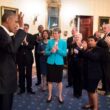Stimulated Opposition—The $825 billion stimulus bill that began as House Resolution 1 moved through the Congress with the speed of a Bush war supplemental budget request. Yet the way it was received suggests that bipartisanship is already history. The opposition’s intent was evident before House Republicans unanimously voted against the bill, which passed by a 244-188 margin. (Eleven Democrats also opposed the bill.) Republicans created a caricature of the stimulus bill; then attacked it for being too fast, too much, and too short on tax cuts they insist are the key to reviving the economy.
“Too fast” might be a fair criticism of the process if the staff of House Appropriations Committee Chair David Obey (D-WI) hadn’t been working on the bill since November. A source close to the process in the House said drafting of the bill was actually slowed by the challenge of spending such a large sum without creating bottlenecks that impede the flow of federal money needed to revive the economy. The bill had a second markup in the Ways and Means Committee, where Republicans proposed amendments. And it was open to some amendments on the House floor.
“Too much” is a hard sell. Liberal economists Paul Krugman at Princeton and James K. Galbraith at the University of Texas at Austin worry that $800-$900 billion is too little. Krugman makes the case for $600 billion per year for two years—a 50 percent increase over proposed spending. Galbraith says the risk of falling short is outweighed by the risk of doing too little, and argues for more spending and more creative uses of money. The Congressional Budget Office seems to agree, predicting that the stimulus bill will only halfway close the gap the recession has created in the nation’s gross domestic product.
“Not enough tax cuts” is harder to swallow. Republican budget hawks (who spent wildly during the Bush administration) don’t get a half a loaf, but they get a third. Approximately $275 billion in the stimulus package was tax relief when it passed the House. A defeated House Republican substitute bill was almost exclusively tax cuts, suggesting that Republican opposition has more to do with posturing than legislating. Administration economists Christina Romer and Jared Bernstein—and the number crunchers at the non-partisan Congressional Budget Office—agree that tax cuts don’t jump start the economy as quickly as does money spent on creating jobs. The economists provide charts, figures, and multipliers to explain how spending on job creation moves money into the economy.
Speaking to CBS News the Sunday before the bill went to the Senate, House Financial Services Committee Chair Barney Frank (D-MA) bypassed the technical economic formulas. “No tax cut builds a road, no tax cut puts a cop on the street, no tax cut educates a child,” Frank said.
The “N” Word—Rep. Barney Frank jumped ugly on a reporter who asked about government nationalization of banks, at the end of a Financial Services Committee meeting. “I don’t know what that means,” Frank snapped. “The government buys all banks? The government should take over all banks?” It was evident that the committee chairman didn’t want to discuss the prospect of nationalizing failing banks—even if it was part of an internal White House policy debate. Frank did predict that banks will need funding beyond what remains in the Troubled Assets Relief Program (TARP)—the $700 billion bailout fund the Congress approved in October. Half of the TARP funding was spent by the Bush administration.
When a reporter asked a question about Bank of America, Frank referred to McCain campaign adviser John Thain. “I guess Senator McCain’s pick for Treasury Secretary didn’t do such a good job,” Frank said of Thain. The former Merrill Lynch CEO was recently fired by Bank of America, which acquired Merrill Lynch in September 2008. After huge losses ($15 billion in the last quarter of 2008), Thain approved bonuses for Merrill Lynch employees and asked the board for a bonus for himself. He also spent $1.2 million renovating his office.
The Bank of America received TARP funds from the Bush administration, Frank said, because the Bush administration needed B of A to buy Merrill Lynch. And now B of A is in serious trouble and back at the TARP trough looking for an additional $20 billion. The complexity of the financial engineering that has occurred since Lehman Brothers collapsed in September and the continuing loss of bank book value and stock prices suggests that the bank bailout is just beginning—or even worse, failing.






0 Comments